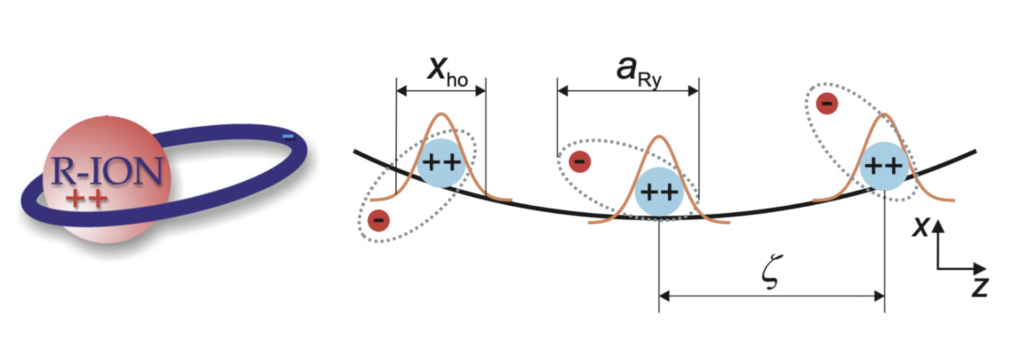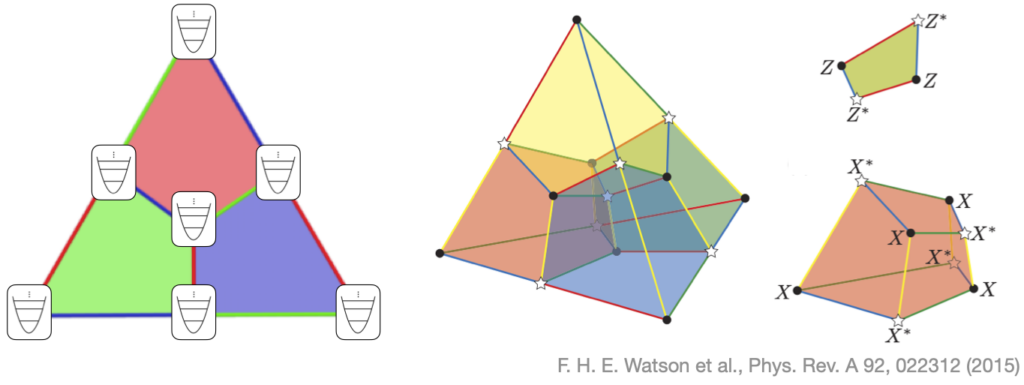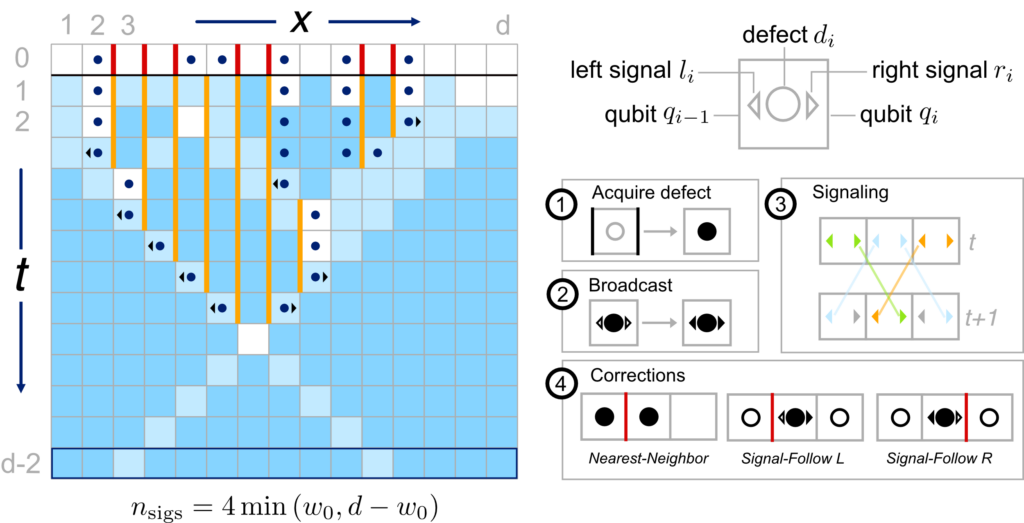We are always looking for highly skilled and motivated applicants to join our research group as project bachelor or master students, PhD students or postdocs.
We have currently a number of PhD and postdoc openings, in particular for postdocs with ideally a strong background in AMO physics and quantum error correction – more information can be found here.
For inquiries regarding the positions, please contact Markus Müller.
B.Sc. and M.Sc. Projects

A. Schuckert et. al. arXiv 2411.08955 (2024)
B.Sc./M.Sc. Project: Fermionic fault-tolerant quantum computing
Quantum simulations of fermionic systems with qubit-based quantum computers require that fermionic exchange statistics are encoded on a software-level. This algorithmic overhead can be avoided by utilizing physical fermionic modes as computational building blocks, such as fermionic atoms trapped in optical tweezers. Executing robust quantum algorithms in such setups, however, demands the application of quantum error correction techniques.
In this project you will become acquainted with fermionic quantum computing and you will explore how quantum error correction and fault-tolerant logical gates can be performed in fermionic quantum processors. Possibly, you will study the realization of such schemes with neutral atoms in tweezer arrays.
[1] A. Schuckert et. al. arXiv 2411.08955 (2024)
[2] R. Ott et. al. arXiv 2412.16081 (2024)
[3] D. González-Cuadra et. al, PNAS 120 35 (2023)
Contact: Luis Colmenarez, Markus Müller

B.Sc. Project Quantum Processing with Trapped Rydberg Ions
Trapped Rydberg ions are a promising novel emerging physical platform to build quantum computers and simulators. Here, trapped ions are laser-excited to Rydberg states, where they behave as a composite object and exhibit strong and long-range interactions, which enable the realisation of fast quantum gate operations and quantum simulation of many-body spin models. In this project, you will theoretically model Rydberg ions in a Paul trap and use analytical techniques as well as numerical methods (such as Lindblad quantum master equations) to develop protocols and study the performance of quantum gate operations and building blocks for quantum error correction in this system.
Contact: Katrin Bolsmann, Markus Müller

B.Sc./M.Sc. Project: Fundamental properties of topological and LDPC codes
In light of recent developments in quantum error correction (QEC) (see Ref.), particularly with the introduction of new tools such as the coherent information, we will investigate fundamental properties of QEC codes, including equivalences between families of topological and subsystem codes, as well as the extension of these tools to low-density parity check (LDPC) codes. The project involves learning, developing, and applying analytical and numerical techniques to both theoretical and practical problems of relevant QEC codes.
[1] Fan et al. PRX Quantum 5, 020343 (2024)
[2] Colmenarez, et al. Physical Review Research 6, L042014 (2024)
[3] Huang et al. arxiv:2412.12279 (2024)
[4] Colmenarez et al. arXiv:2412.16727 (2024)
Contact: Luis Colmenarez, Markus Müller

M.Sc. Project: Scalable Decoders for Qudit Quantum Error Correcting Codes
Quantum error-correcting codes protect quantum information from decoherence and are a key ingredient for fault-tolerant quantum computing. Recently, encoding information in higher-dimensional Hilbert spaces (qudits) has gained increasing attention [Kep2025]. However, only a limited number of decoding approaches exist for general qudit stabilizer codes and protocols [Lai2021, Sha2024].
In this project, you will study recent advances in decoding qubit codes and extend them to the qudit setting, leveraging general-purpose techniques such as belief propagation (BP) with post-processing [Rof2024]. You will contribute to improving both decoding speed and accuracy, with the long-term goal of enabling real-time decoding.
[Kep2025] Keppens, J., Eggerickx, Q., Levajac, V., Simion, G., & Sorée, B. Qudit vs. qubit: Simulated performance of error-correction codes in higher dimensions. Phys. Rev. A, 112(3), 032435 (2025).
[Lai2021] Lai, C.-Y., & Kuo, K.-Y. Log-Domain Decoding of Quantum LDPC Codes Over Binary Finite Fields. IEEE Transactions on Quantum Engineering, 2,2103615 (2021).
[Sha2024] Sharma, A. K., & Garani, S. S. Entanglement-assisted fault-tolerant encoding and decoding for qudit stabilizer codes. Phys. Rev. A, 110(6), 062424 (2024).
[Rof2020] Roffe, J., White, D. R., Burton, S., and Campbell, E. Decoding across the quantum low-density parity-check code landscape. Phys. Rev. Res., 2(4), 043423 (2020).
Contact: Josias Old, Markus Müller

Zhang and Tarbutt, PRX Quantum 3, 030340 (2022)
M.Sc. Project: Rydberg assisted gates between molecular qudits
Ultracold molecules in optical tweezer arrays are emerging as a new platform for quantum technologies [1]. Their quantized internal rotations host in principle infinitely many states, which can act as qudits with a large dimension d >> 2. Prior work has demonstrated long coherence times and high-fidelity single qudit gates [2] However, how to implement fully controlled high-fidelity two-qudit gates remains an open challenge. Recently, hybrid molecule-Rydberg platforms have been proposed to optimize two-qubit (d=2) gates between molecules[3,4], and experiments are starting to explore these settings. [5] We will generalize these qubit gates to qudits.
In this project, you will learn the necessary background on molecular and atomic structure and their interactions. You will develop microscopic models of two-qudit gates and model them in the presence of experimentally relevant noise sources. Based on this, you will develop robust and efficient gates between molecular qudits.
[1] Cornish et al. Nature Physics 20, 730 (2024)
[2] Hepworth et al. Nature Communications 16, 7131 (2025)
[3] Zhang and Tarbutt, PRX Quantum 3, 030340 (2022)
[4] Wang et al. PRX Quantum 3, 030339 (2022)
[5] Guttridge et al. Phys. Rev. Lett. 131, 013401 (2023)
Contact: David Wellnitz, Markus Müller

B.Sc / M.Sc. Project: Taking quantum error correction to the next level
In analogy to classical binary information, the quantum bit (qubit) carries binary quantum information using two levels of a physical system. However, nature provides a much richer energy structure in which multiple levels are available and controllable. Universal control of such multilevel quantum systems has already been experimentally demonstrated in trapped-ion platforms, motivating the use of d-level systems (qudits) for quantum computation, which can enable more efficient algorithms. With this level of control now established, a central open challenge is to find reliable ways to protect the stored quantum information from noise during computation. To this end, quantum error correction is required.
In this project, you will implement qudit quantum error correction codes, simulate fault-tolerant protocols and their thresholds, and compare their performance to the qubit case.
[1] M. Ringbauer et al. Nature Phys. 18, 1053-1057 (2022)
[2] L. Postler et al. Nature 605, 675-680 (2022)
[3] F. H. E. Watson et al., Phys. Rev. A 92, 022312 (2015)
Contact: Irina Heinz, Markus Müller

B.Sc / M.Sc. Project: Taking quantum error correction to the next level
In analogy to classical binary information, the quantum bit (qubit) carries binary quantum information using two levels of a physical system. However, nature provides a much richer energy structure in which multiple levels are available and controllable. Universal control of such multilevel quantum systems has already been experimentally demonstrated in trapped-ion platforms, motivating the use of d-level systems (qudits) for quantum computation, which can enable more efficient algorithms. With this level of control now established, a central open challenge is to find reliable ways to protect the stored quantum information from noise during computation. To this end, quantum error correction is required.
In this project, you will implement qudit quantum error correction codes, simulate fault-tolerant protocols and their thresholds, and compare their performance to the qubit case.
[1] M. Ringbauer et al. Nature Phys. 18, 1053-1057 (2022)
[2] L. Postler et al. Nature 605, 675-680 (2022)
[3] F. H. E. Watson et al., Phys. Rev. A 92, 022312 (2015)
Contact: Irina Heinz, Markus Müller

M.Sc. Project: Discover local decoders via neural cellular automata
Scalable decoding is an essential ingredient for large-scale fault-tolerant quantum computation [1]. To execute complex algorithms, we require high-precision logical qubits protected by large-scale Quantum Error Correction (QEC) codes. Local decoders are prime examples of scalable decoders; because they rely only on neighborhood information, their cycle time does not scale with the code size.
In this project, we explore local decoding for stabilizer codes using Neural Cellular Automata (NCA). Inspired by recent advances in trainable CA [2-4], we will develop a framework to discover local rules based on syndrome data. We begin by validating the framework on the repetition code to see if the NCA can rediscover or improve upon known CA decoders [5]. We then extend this to more complex codes and, if time allows, include constraints such as rule partitioning. This final step aims to elevate classical CA rules to Quantum Cellular Automata (QCA) [6, 7], potentially enabling scalable and measurement-free QEC.
[1] A. G. Fowler et al., Phys. Rev. A 86, 032324 (2012).
[2] A. Mordvintsev et al., Distill (2020).
[3] E. Pajouheshgar et al., arXiv:2412.15187 (2024).
[4] P. Miotti, et al., arXiv:2506.04912 (2025).
[5] L. Paletta, et al., arXiv:2505.06453 (2025).
[6] T. Farrelly, Quantum 4, 368 (2020).
[7] T. L. M. Guedes, et al., Phys. Rev. Lett. 133, 150601 (2024).
Contact: Don Winter, Markus Müller

Yunzhe Zheng and Dong. E. Liu, Quantum 9, 1858 (2025)
M.Sc. Project: Investigating magic state distillation protocols via dynamical maps
To achieve universal fault-tolerant quantum computation, one needs to implement logical non-Clifford gates, which are usually more challenging than logical Clifford gates within quantum error-correcting codes. Several approaches have been developed to realize logical non-Clifford gates fault tolerantly. One of the most promising is the distillation of high-fidelity resource states, known as magic states [1], which can then be consumed using Clifford circuits to implement non-Clifford gates.
Several key properties of magic state distillation protocols can be analyzed by mapping them to dynamical maps [2,3]. In this project, you will use these techniques to investigate the robustness of magic state distillation protocols under realistic noise models and potentially develop new circuits or protocols that exhibit improved performance in such settings.
[1] S. Bravyi and A. Kitaev, Phys. Rev. A 71, 022316 (2005)
[2] Y. Zheng and D. E. Liu, Quantum 9, 1858 (2025)
[3] Y. Zheng, Y. Zhao and D. E. Liu, arXiv:2503.01165 (2025)
Contact: Aron Marton, Markus Müller

F. Venn and B. Béri, Phys. Rev. Research 2, 043412 (2020)
M.Sc. Project: Constructing quantum error-correcting codes from Majorana graphs
Quantum error-correcting codes are essential for protecting quantum information against environmental noise. One of the most widely studied families of such codes are surface codes. The logical states of surface codes can be understood by mapping a system of Majorana fermions defined on a planar graph to a system of qubits [1,2,3]. This mapping provides a clear interpretation of the logical degrees of freedom of planar surface codes: twist defects can be associated with unpaired Majorana modes. Moreover, certain logical operations admit a natural interpretation in terms of braiding and measurement of these logical Majorana fermions [4].
In this project, you will generalize this construction to other, possibly higher-dimensional, quantum error-correcting codes by defining new classes of Majorana graphs and mapping them to qubit systems. The focus will be on understanding which logical operations can be realized within this framework, as well as exploring other potentially interesting properties of these newly constructed codes.
[1] S. Bravyi et al. npj Quantum Information 4, 55 (2018)
[2] F. Venn and B. Béri, Phys. Rev. Research 2, 043412 (2020)
[3] R. Sarkur and T. J. Yoder, Quantum 8, 1416 (2024)
[4] Y. D. Lensky et al. Annals of Physics 452, 169286 (2023)
Contact: Aron Marton, Markus Müller

E. Takou and K. R. Brown, Phys. Rev. A 112, 052414 (2025)
B.Sc/M.Sc. Project: Experimentally informed decoding of quantum error-correcting codes
The error detection capabilities of quantum error-correcting codes are captured by detector error models, in which error mechanisms trigger one or more detectors. The resulting pattern of detector violations constitutes the experimentally accessible syndrome information in quantum error correction experiments. Given a detector error model and an observed syndrome, a decoding algorithm can be applied to infer a likely set of error mechanisms responsible for the observed syndrome.
In real quantum error correction experiments, however, the underlying error mechanisms are not known a priori. Instead, the detector error model can be reconstructed directly from experimentally measured syndrome statistics [1–3]. When such models contain hyperedges—corresponding to error mechanisms that trigger more than two detectors—decoding becomes more challenging. In this project, you will investigate methods to reconstruct detector error models without hyperedges from experimental data and evaluate how effectively these simplified models can be used for decoding.
[1] S. T. Spitz et al. Adv. Quantum Technol., 1, 1800012 (2018)
[2] A. Remm et al. arXiv:2502.17722
[3] E. Takou and K. R. Brown, Phys. Rev. A 112, 052414 (2025)
Contact: Aron Marton, Markus Müller
(last updated Jan 15, 2026)

